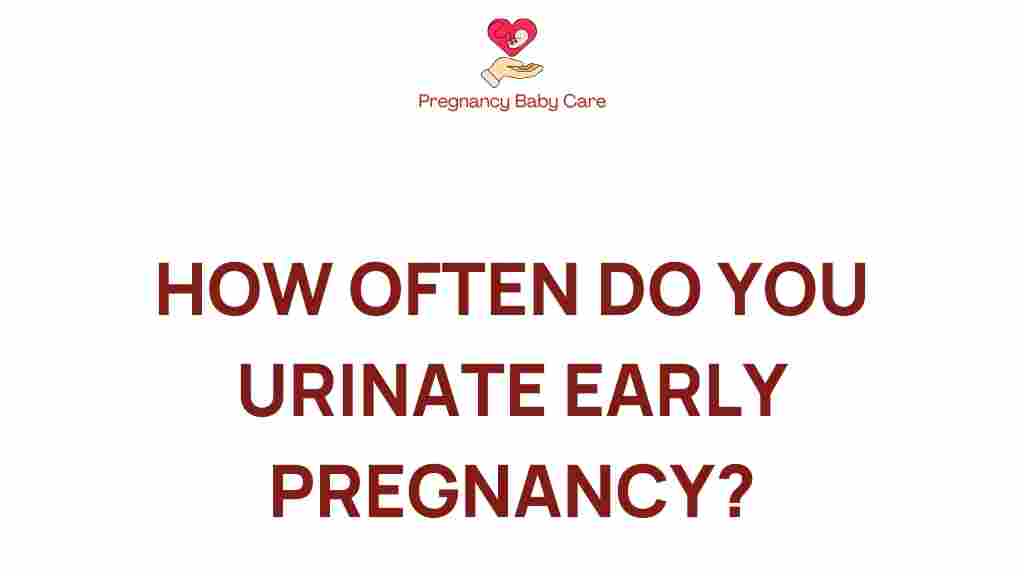Unraveling the Mystery: How Often Do You Urinate in Early Pregnancy?
Early pregnancy can be an exciting yet confusing time for many women. As your body undergoes numerous changes, one common symptom that often raises questions is frequent urination. Understanding how often you may need to urinate in early pregnancy is essential for your pregnancy health and overall well-being. In this article, we will explore the reasons behind frequent urination, the role of hormonal shifts, bladder changes, and offer advice on hydration and health awareness during this transformative period.
Understanding Frequent Urination in Early Pregnancy
Frequent urination is one of the many symptoms that can occur during early pregnancy. While it can be annoying, it is usually a normal part of the process. Let’s delve deeper into why this happens and how often you might find yourself heading to the bathroom.
How Hormonal Shifts Affect Urination
During the first trimester, your body experiences a surge in hormones, particularly human chorionic gonadotropin (hCG) and progesterone. These hormonal shifts have several effects on your body, including:
- Increased Blood Volume: Pregnancy increases blood volume, leading to more fluid in your system.
- Kidney Function: Your kidneys work harder to filter this increased blood volume, which can lead to more frequent urination.
- Bladder Sensitivity: Hormonal changes can also make your bladder more sensitive, making you feel the need to urinate more often.
Bladder Changes During Early Pregnancy
Your bladder undergoes changes during early pregnancy that contribute to frequent urination. Here’s how:
- Increased Size: As your uterus expands, it can press against your bladder, reducing its capacity and making you feel the need to urinate more frequently.
- Changes in Muscle Tone: Pregnancy hormones can also affect the muscle tone of the bladder, altering how often you need to empty it.
Frequency of Urination in Early Pregnancy
Every woman is different, but many women in early pregnancy report needing to urinate more than usual. While you might normally go to the bathroom every few hours, during early pregnancy, you may find yourself visiting the restroom:
- Every hour or even more frequently, especially in the evening.
- With urgency that makes it feel like you need to go immediately.
This can be particularly pronounced during the first trimester, where hormonal shifts and bladder changes are at their peak.
Staying Hydrated During Early Pregnancy
Despite the frequent urination, staying hydrated is crucial for both you and your baby. Here are some tips for managing hydration:
- Drink Plenty of Water: Aim for 8-10 glasses of water a day. This helps maintain your hydration and supports kidney function.
- Monitor Your Fluid Intake: While you may be urinating frequently, ensure you are still getting enough fluids throughout the day.
- Avoid Caffeine: Caffeinated drinks can act as diuretics and may increase urination further.
Remember, adequate hydration is a cornerstone of pregnancy health, even if it means more trips to the bathroom.
Common Symptoms of Early Pregnancy
Frequent urination is just one of many symptoms you may experience in early pregnancy. Here are some other common symptoms:
- Nausea: Often referred to as morning sickness, this can occur at any time of day.
- Fatigue: Increased tiredness is common due to hormonal changes.
- Breast Changes: Tenderness and swelling in the breasts can occur as early as the first few weeks.
- Food Cravings or Aversions: Changes in your taste preferences are typical.
Troubleshooting Frequent Urination in Early Pregnancy
If you find yourself concerned about how often you are urinating, here are some troubleshooting tips:
- Keep a Diary: Track your fluid intake and urination frequency. This can help you recognize patterns.
- Consult with Your Doctor: If you experience pain, burning, or blood in your urine, it’s essential to speak with a healthcare professional.
- Limit Fluids Before Bed: If nighttime trips to the bathroom disrupt your sleep, consider reducing fluid intake in the evening.
When to Seek Medical Advice
While frequent urination is usually a normal symptom of early pregnancy, certain situations warrant a conversation with your healthcare provider:
- If you experience severe pain or burning during urination.
- If you notice blood in your urine.
- If your urination is accompanied by unusual symptoms like fever or chills.
Being aware of your body and any changes is vital for pregnancy health. If in doubt, do not hesitate to reach out to your doctor.
Conclusion
Frequent urination is a common symptom of early pregnancy, largely driven by hormonal shifts, bladder changes, and increased blood volume. While it can be inconvenient, it is typically not a cause for concern. Ensuring you stay hydrated is key to maintaining your health and supporting your baby’s development. Remember to stay aware of your symptoms and communicate with your healthcare provider regarding any concerns you might have during this beautiful and transformative time.
For more information about pregnancy symptoms and health tips, visit Healthline’s pregnancy health resources. If you need to connect with other expectant mothers, consider checking out community forums for support and shared experiences.
This article is in the category Pregnancy and created by PregnancyBabyCare Team
